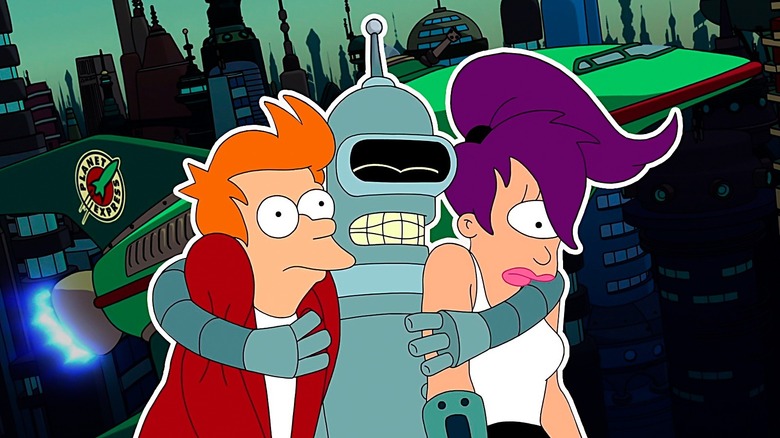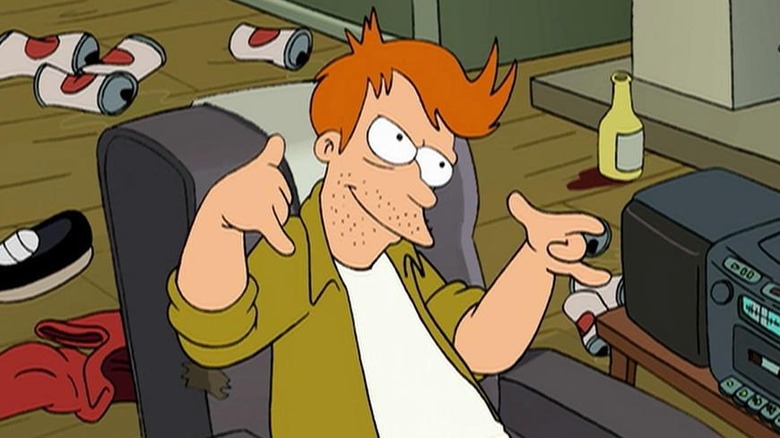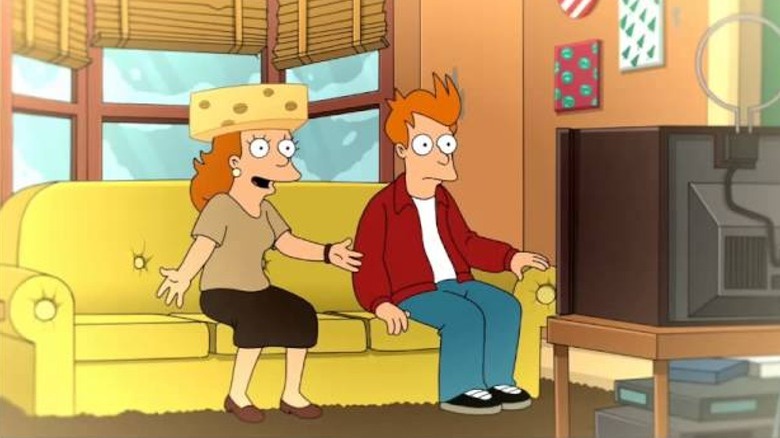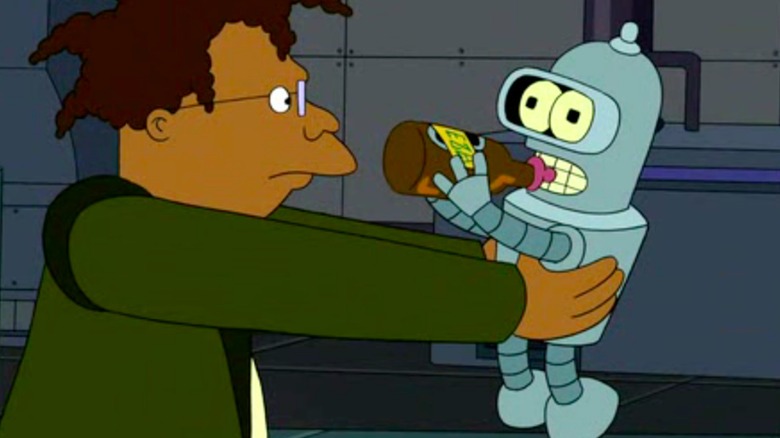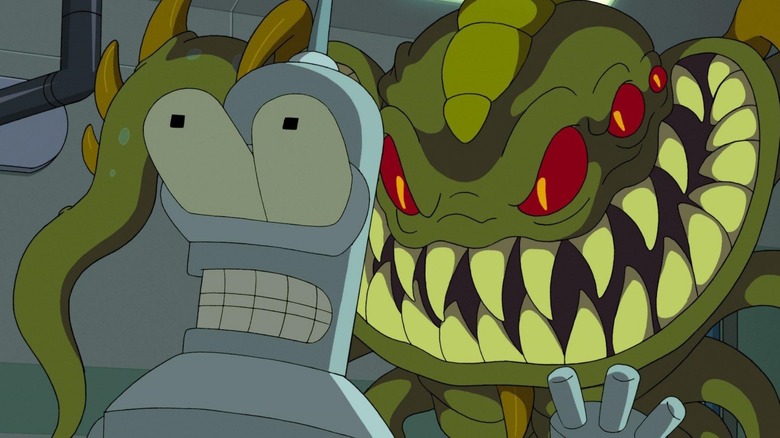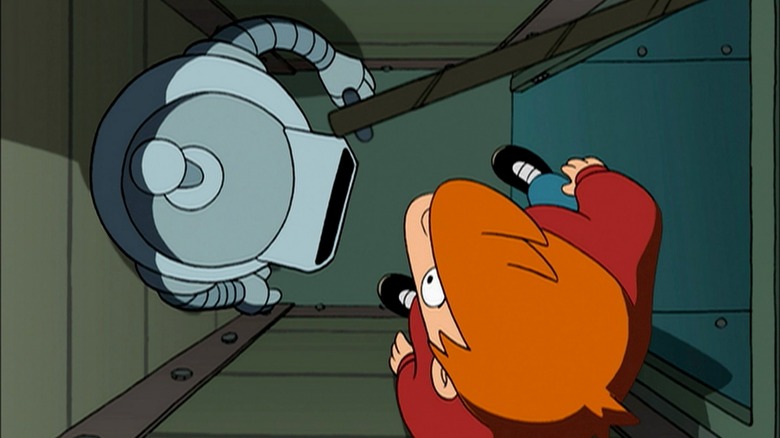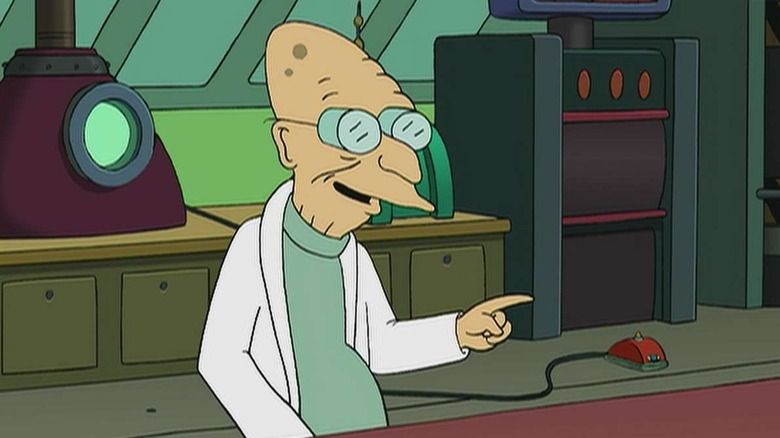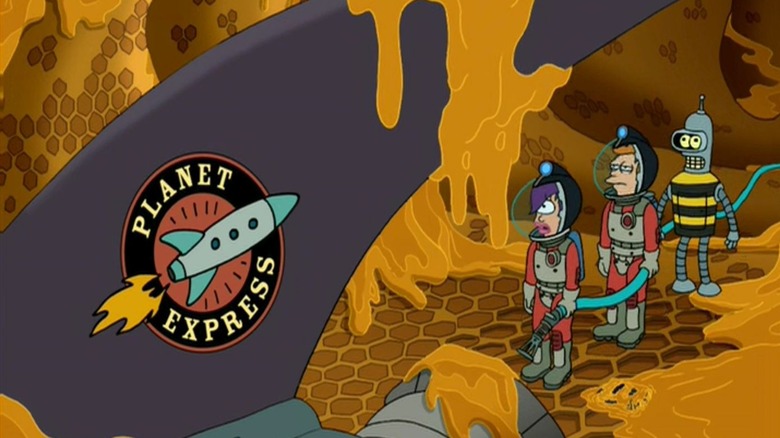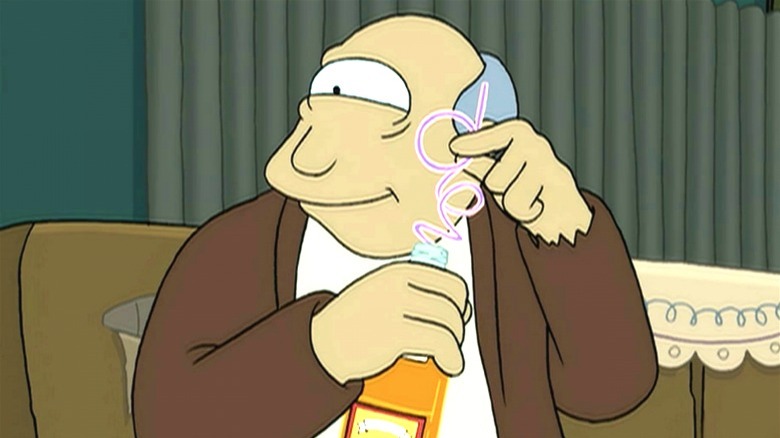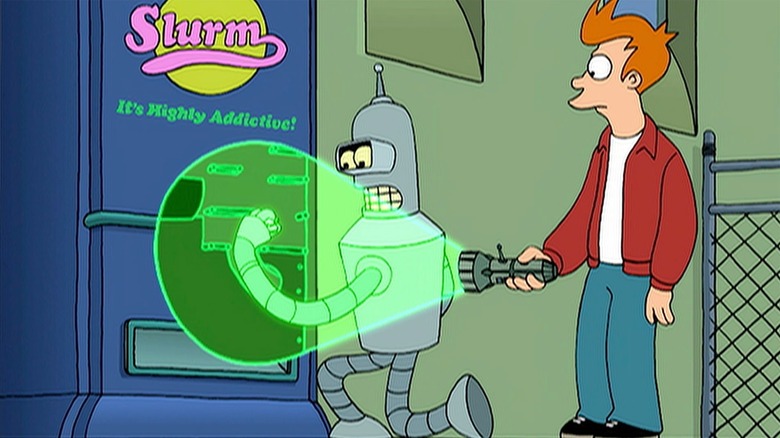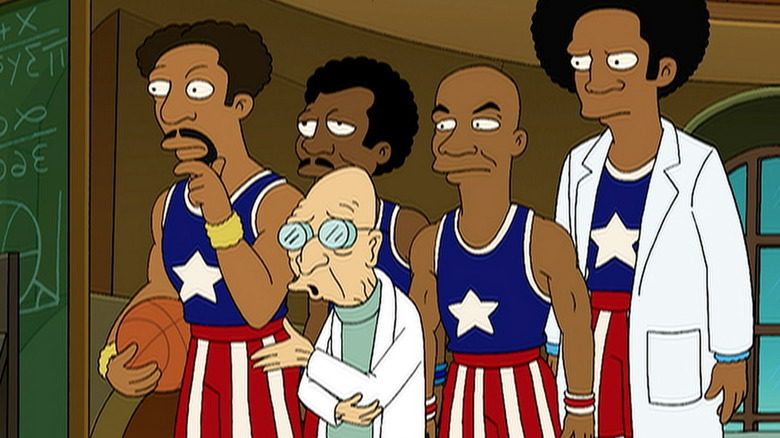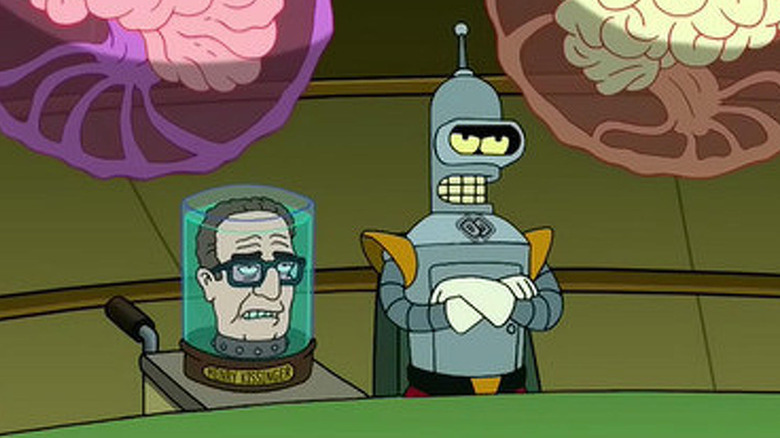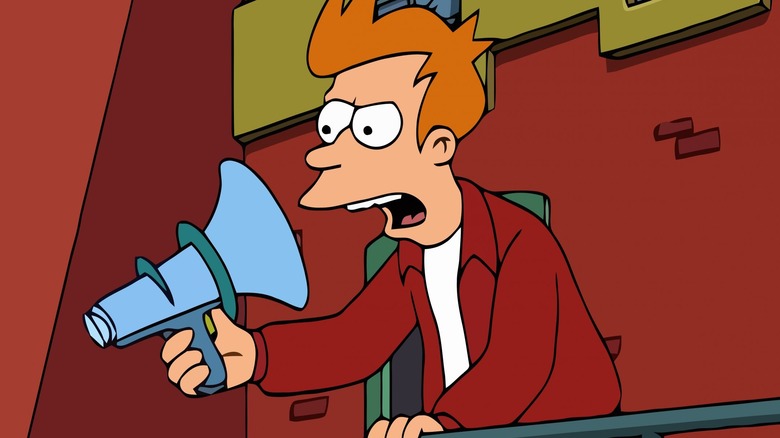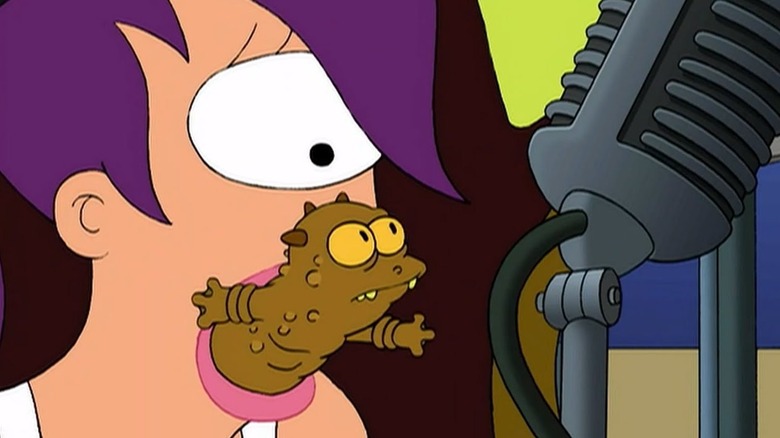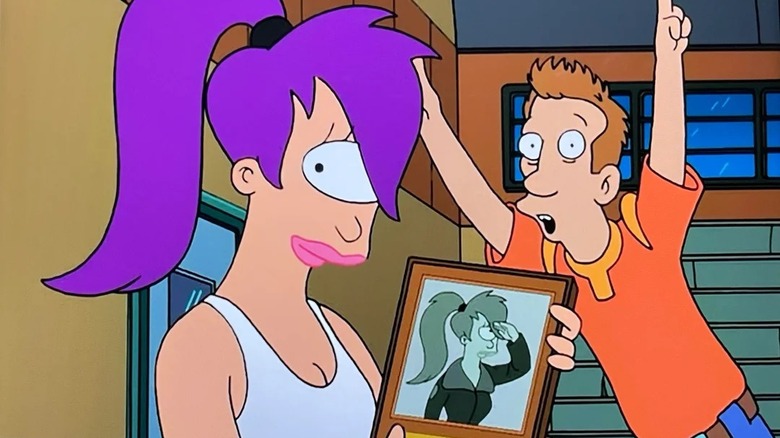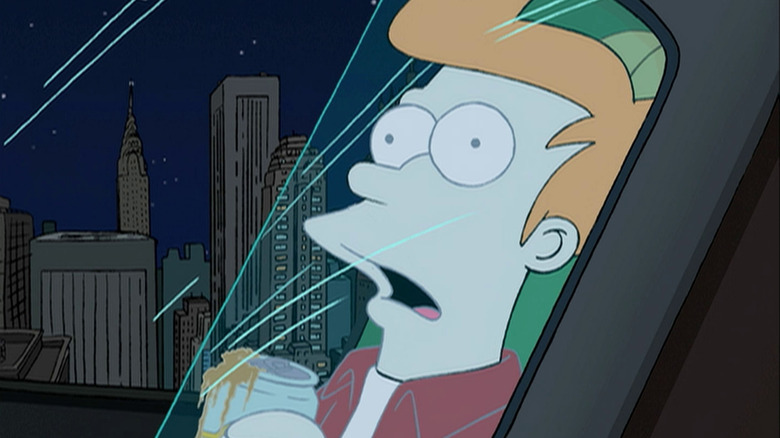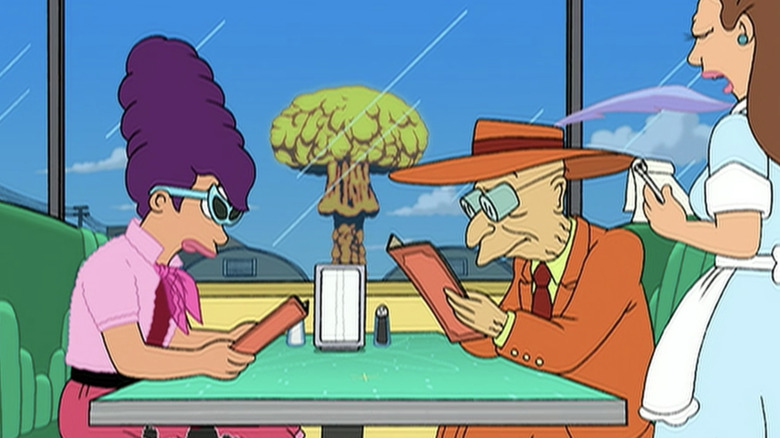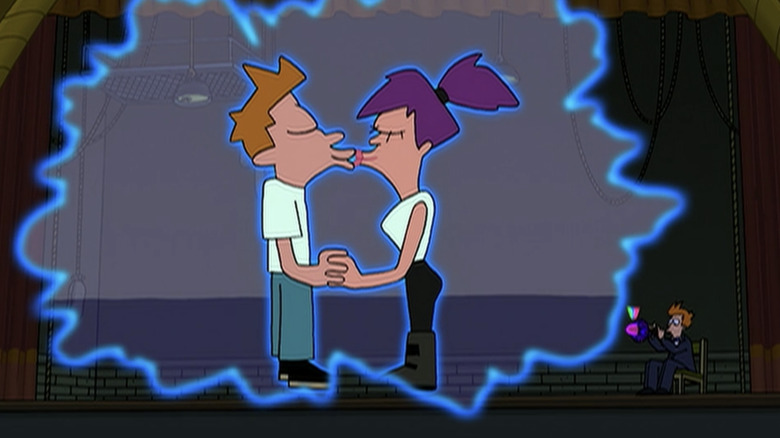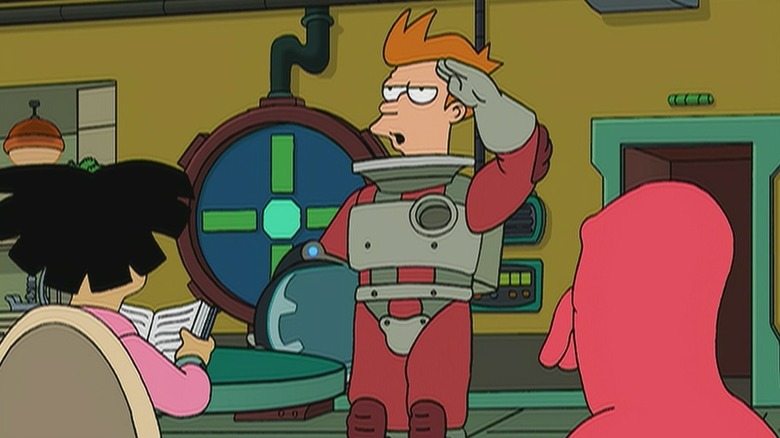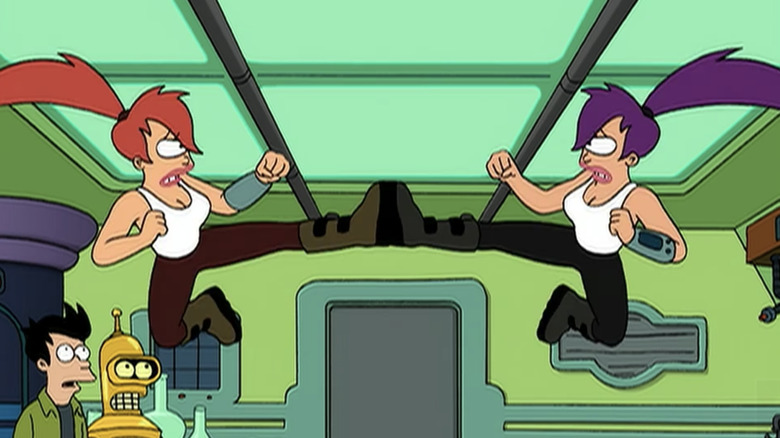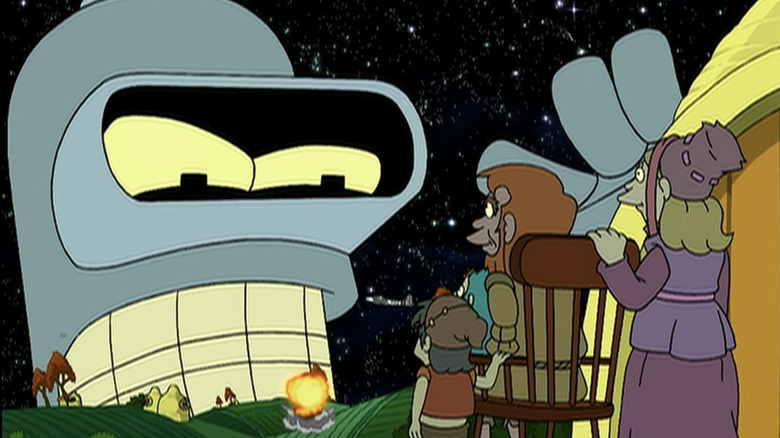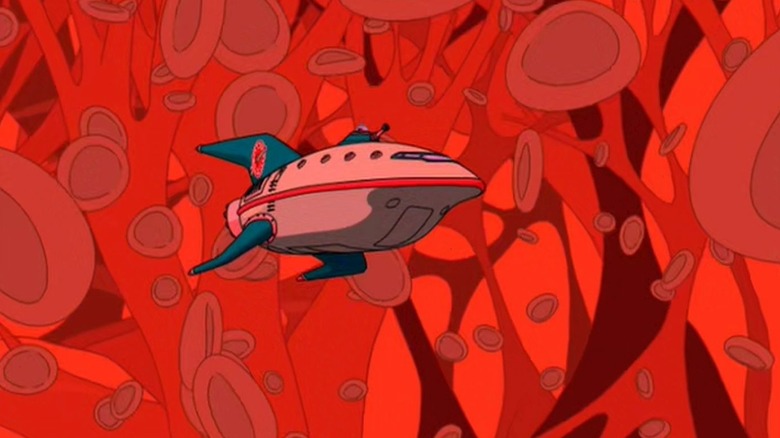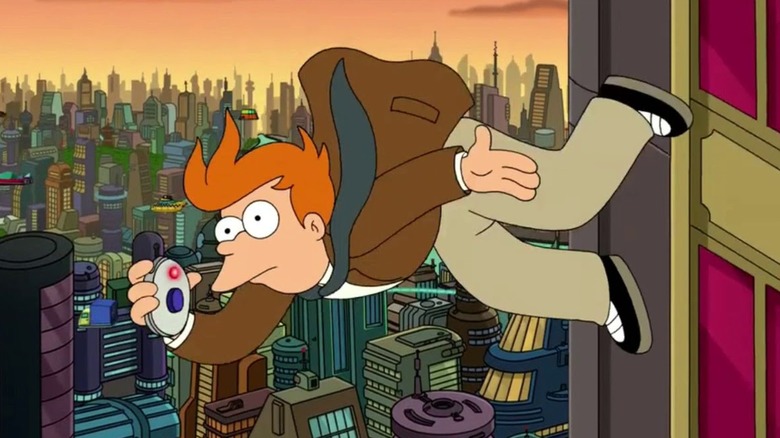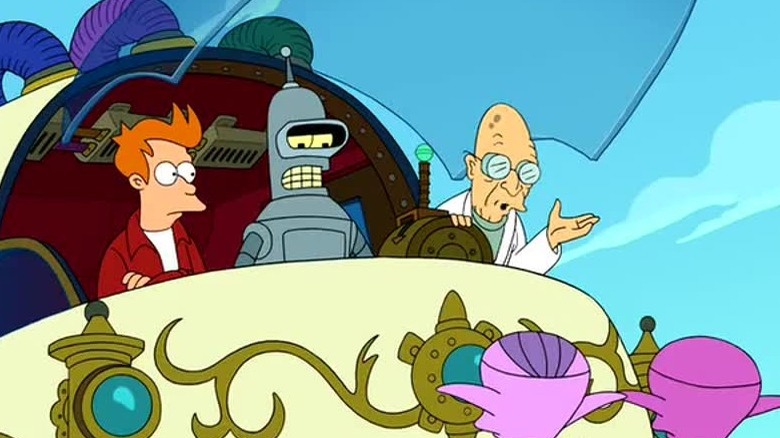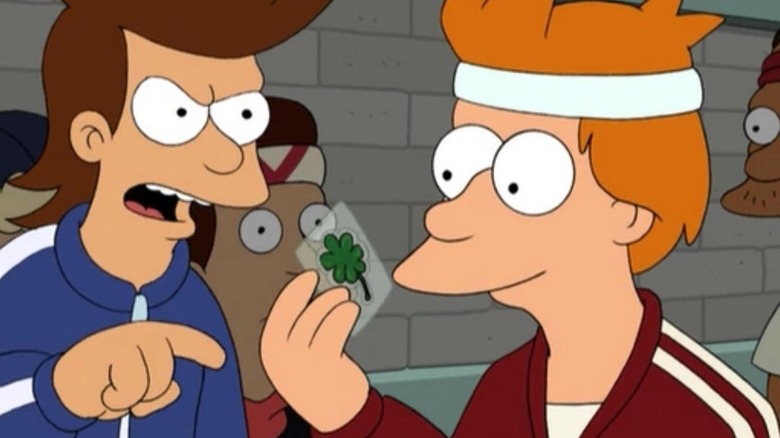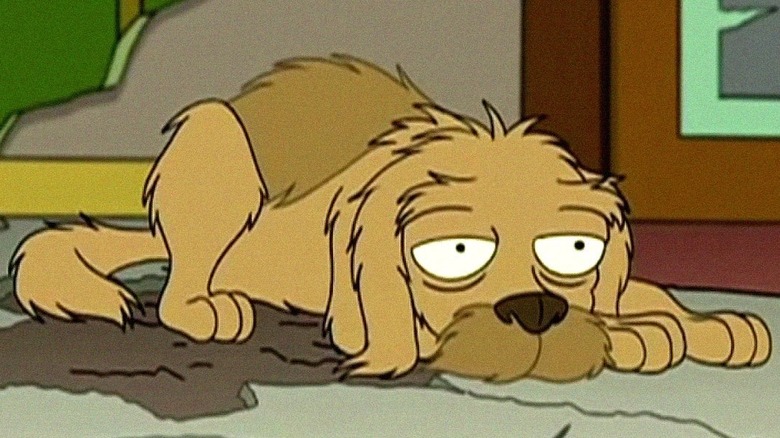25 Best Futurama Episodes Ranked
Matt Groening's record-shattering success with "The Simpsons" initially seemed like a once-in-a-lifetime achievement, but Groening and some of his most talented collaborators still had another masterpiece in them: "Futurama," one of the most bizarre, hilarious, and genuine TV shows of the past few decades. The possibilities offered by the world of tomorrow let the creators of the sci-fi comedy run wild, and some "Futurama" fans argue that it's actually Groening's best work.
The adventures of unfrozen 20th century delivery boy Philip J. Fry (Billy West) and the Planet Express crew are usually very funny and often satisfyingly intelligent. There's so much greatness going on in "Futurama" that it's hard to decide which episodes are the real highlights, but we've done exactly that. After combing through the entire series and cross referencing our favorites with the top-rated episodes on IMDb, we've arrived at a solid list. These are the 25 best "Futurama" episodes, ranked.
25. A Fishful of Dollars (Season 1, Episode 6)
Fry adapts to living in the year 3000, but he's really a man of his own time, which takes a toll. Still, "A Fishful of Dollars" begins with one of the bonuses of being frozen for a thousand years when Fry goes to the bank. His balance in 1999 was $0.93, which increased a bit thanks to an interest rate of 2.25%, leaving him with $4.3 billion. He immediately adapts to being wealthy and buys anything and everything he can, including Ted Danson's skeleton. He also devolves a bit and sets himself up in a 20th-century apartment filled with VHS tapes, ancient technology, and toys.
Fry sits around all day watching reruns of his favorite shows, but when he learns that anchovies — his favorite pizza topping — are extinct, it truly bums him out. He buys the last remaining can of anchovies at an auction for $50 million, earning the ire of Mom (Tress MacNeille), the tyrannical CEO of MomCorp. "A Fishful of Dollars" builds on Fry's character development by showing how attached he is to his 20th-century lifestyle, but what's truly important to him isn't stuff, despite what he claims. Over the course of this episode, he realizes that his real passion is for his friends.
24. Game of Tones (Season 10, Episode 10)
When Fry entered the cryogenic tube, his life changed forever. He lost his family, and while he often insists they're terrible people, the truth is that Fry misses them. He's especially sad about his mom, and "Game of Tones" offers some closure. The episode begins with an alien vessel broadcasting a devastating tone that destroys planets, and it's headed for Earth. Fry recognizes the tone but cannot place it, so Professor Farnsworth (Billy West) puts Fry into a dream state to relive his last day in 1999.
While he's initially reluctant, seeing his family again taps into Fry's emotional loss of his mother, and he attempts to remain with her, abandoning his mission. The team interrupts and tries to get Fry back on task, reminding him of what's at stake. He remembers the sound: It turns out to be Nibbler's key fob for his spaceship, which he used to ensure Fry entered the cryogenic tube. Once that's all cleared up and the planet is safe, Nibbler offers to repay him somehow — and does so later that evening. We won't spoil what he does for Fry and his mother, but it makes for a very touching finale.
23. Lethal Inspection (Season 7, Episode 6)
Bender (John DiMaggio) is one of the core characters in "Futurama," and whenever an episode centers around him, it often stands out. "Lethal Inspection" is a Bender-heavy episode, but it also features a lot of character development for Hermes (Phil LaMarr), the resident bureaucrat on the Planet Express. In the episode, Bender learns that he has a manufacturing defect — he doesn't have a backup unit. This effectively makes him mortal because, should his body be destroyed, a backup can't be loaded into another one. As you might expect, Bender doesn't take the realization that he might die particularly well.
Determined to get answers, he recruits Hermes to help him find the identity of Inspector Number Five, the person who let him get through quality control despite his defect. The story sees the pair follow one clue to the next, ultimately hitting a dead end. When Mom learns of Bender's defect, she sends Killbots to destroy him, so Hermes fakes his death. This leads to a flashback depicting Bender's manufacturing and a plot twist that, while not terribly shocking, is certainly heartwarming. The episode shows Hermes' soft side and willingness to do the right thing, even when his duties dictate that he should do the opposite.
22. Murder on the Planet Express (Season 10, Episode 11)
Some episodes of "Futurama" are purposefully silly, like the one about Bender becoming a were-car or the stories told in the "Anthologies of Interest" episodes. "Murder on the Planet Express" is easily one of the silliest episodes of the show, because it's pure parody. The episode title is a play on Agatha Christie's "Murder on the Orient Express," but it's more of a mashup of "The Thing" and "Alien." It follows the crew on a team-building exercise meant to curb the bickering within the close-knit group.
The action occurs on the Planet Express ship, which becomes a house of horrors after the man leading the exercise, Dan McMasters (David Herman), turns into a monster that shuts down parts of the ship and tries to eat its way through the crew. As the crew breaks up into teams, they must avoid the creature while working together to defeat it. The episode stands out because nothing is held back. The writers let loose every whacky idea they had into one encapsulated story that has no bearing on the show's overarching narrative, making for an effective and humorous escape.
21. I, Roommate (Season 1, Episode 3)
When Fry wakes up in the 31st century, the first person he befriends is Bender, and it takes no time for them to become close. Bender helps him elude Leela (Katey Sagal) as she chases him throughout the pilot, and "I, Roommate" builds on this budding friendship. When it becomes apparent that Fry is living at Planet Express (making a mess of the workplace in the process), his fed-up colleagues set out to find him a new place. Fry and Bender end up moving in together, and they host a housewarming party with their co-workers.
During the party, it becomes clear that Bender's antenna interferes with the television reception, so instead of cutting it off, Fry suggests he move out. This leaves Bender fairly despondent, and he even stops drinking, which has the opposite effect on a robot. "I, Roommate" shows just how close Bender and Fry really are, strengthening their bond and building a foundation that would continue throughout the entirety of the series. The episode also features some spectacular jokes, which are backed up by a sitcom structure that pays homage to "The Odd Couple."
20. Anthology of Interest I (Season 2, Episode 20)
Some stories are just too wacky, even for "Futurama." Following the lead of the "Treehouse of Horror" episodes from "The Simpsons," the show finds a place for those ideas too insane for actual continuity in siloed-off episodes like this one. Season 2's "Anthology of Interest I" introduces Professor Farnsworth's What-If Machine, which lets the Planet Express crew explore all kinds of possibilities. What if Fry had never been frozen? What if Bender were a Godzilla-sized monster? What if Leela wasn't so level-headed?
The answer to that last question turns out to be particularly brutal: She'd feed Farnsworth to man-eating anteaters so she could get his inheritance. Is it grim? Yes. But that spirit just makes the episode all the more hilarious. And, what's more, this episode actually teases a lot of major storylines, especially the segment in which Fry isn't sent to the future. It may have been intended as a wacky one-off, but "Anthology of Interest I" turned into an important piece of the "Futurama" puzzle.
19. The Sting (Season 5, Episode 9)
We discover in "Space Pilot 3000" that the previous crew of the Planet Express died on the job. In "The Sting," it's revealed that their last gig was collecting honey from giant space bees. Leela's professional pride won't let her pass up the job, and Fry gets skewered with a giant stinger in the process. Of course, "Futurama" doesn't really kill off its main character — but that's about where the predictability of this episode ends. Leela's grief-induced nightmares make it impossible to tell what, if anything, is real.
Like the best "Futurama" episodes, "The Sting" never fails to mix tragedy with comedy. In most shows, this would undercut the drama. But in "Futurama," this results in unforgettable scenes, like Bender tearfully shouting, "Who will make Bender waffles just the way he likes them now?" — or, more darkly, Leela muttering to herself, "I'll find Fry's corpse and keep it under my mattress to remind me that he's dead! That'll prove I'm not insane!" At one point, Farnsworth laughs at his own macabre joke before saying, "Oh, I made myself sad." The whole episode is a summary of what makes "Futurama" so great.
18. Teenage Mutant Leela's Hurdles (Season 5, Episode 7)
"Teenage Mutant Leela's Hurdles" gives "Futurama" a chance to explore Leela's relationship with her parents, Morris and Munda (David Herman and Tress MacNeille). This is meaningful stuff, but for the most part, it results in one of the most purely hilarious episodes of the entire series. We kick off with the Professor chasing after his pet gargoyle ("Pazuuuuuzuuuuuu!"), which leads to a string of great gags regarding his extreme age. Eventually, the Planet Express crew takes him to be "youthacized." Unfortunately, Bender's overenthusiastic pumping dunks the entire gang in de-aging goop.
Watching our heroes endure the humiliations of youth is straight-up hysterical. Leela takes the opportunity to re-do her teenage years with her parents by her side, who seem a little unclear on their responsibilities ("No beer until you've had your tequila!"). Long before that plot can run out of steam, we get a whole new run of jokes as Professor Farnsworth attempts to get the crew back to normal — Zoidberg's (Billy West) various stages of life truly need to be seen to be believed. The laughs don't stop until the end credits.
17. Fry and the Slurm Factory (Season 2, Episode 4)
"Fry and the Slurm Factory" begins with Bender having a fever of 900 degrees. The source of his sickness is a watch he stole from Amy (Lauren Tom), and Professor Farnsworth learns this by using his F-Ray, which can see through anything. It takes almost no time for Fry and Bender to take the F-Ray and use it to win a Slurm contest, finding the golden bottle cap that earns them an invite to the Slurm factory.
The episode plays out like a spoof of "Willy Wonka and the Chocolate Factory," featuring everything from Grunka Lunkas to a boat ride on a river of Slurm. Eventually, the crew learns the truth of where Slurm comes from — and it's not a pleasant revelation. Of course, this doesn't deter Fry from enjoying his favorite 31st-century beverage.
"Fry and the Slurm Factory" adds texture to the "Futurama" universe: Slurm advertisements and posters are spread throughout early episodes, and these posters are the first direct clues to deciphering an alien alphabet (fans decoded it almost immediately). The showrunners later introduced a second language that was much more complex, and it took viewers years to decipher.
16. Time Keeps on Slipping (Season 3, Episode 14)
"Time Keeps on Slipping" introduces two of the series' most durable (and weirdest) ideas: The all-purpose time-altering substance known as chronitons, and the Harlem Globetrotters. "Futurama" reimagines the famous exhibition basketball team as smack-talking interstellar scientists with their own planet. To compete with them, Farnsworth clones a team of atomic supermen and sends the Planet Express crew out to collect chronitons, to get them up to regulation age. This turns out to be a bad idea when the chronitons cause time to skip ahead randomly.
The writers milk this high concept for every gag imaginable. Hermes suggests a solution before we cut to a naked conga line and him admitting he has no idea how this was supposed to work. Fry and Leela jump from their wedding straight to divorce court. A time-tossed Farnsworth sends his crew off with a confused, "Off you go, apparently!" — a perfect summation of the episode's fantastically wacky approach.
15. War is the H-Word (Season 3, Episode 2)
"Futurama" may be a mashup of sci-fi and sitcom formulas, but that hasn't stopped it from skewering pretty much every other genre. War movies get a good kicking in the memorable episode "War is the H-Word." Even the excuse to get the plot rolling is hysterical: Bender and Fry join the army just to get a 5% military discount at the corner store. The recruiting officer reassures them they can quit as soon as they've gotten their bargain, "Unless, of course, war were declared." Then a siren sounds, and he flatly states, "War were declared."
This episode has plenty of classic moments from the hilariously arrogant Zapp Brannigan (Billy West), who acts as the boys' commanding officer. Memorably, Zapp's beleaguered assistant Kif (Maurice LaMarche) finally gets to bully someone else for a change when Fry gets demoted to being his assistant. Things culminate in our hapless heroes being shipped out to Spheron I to battle against the ball-like aliens that call the planet home, which is cartoon slapstick at its finest.
14. The Day the Earth Stood Stupid (Season 3, Episode 7)
Like "The Simpsons," which often revolves around the beer-loving, donut-munching patriarch of the titular family, "Futurama" features an incredibly dumb hero. However, Fry's stupidity sometimes works in his favor. This is the case in "The Day the Earth Stood Stupid," in which an invasion of intelligence-sapping aliens makes him Earth's smartest man by default. This is a comedic goldmine of an idea, and the writers use it for all it's worth.
There are some fantastic gags in this episode. Alien newscaster Morbo (Maurice LaMarche) mistaking the letter T on his teleprompter for "a little man in a hat" is a hysterical high point: "Hello, little man. I WILL DESTROY YOU!" But "Futurama" is never content with low-hanging fruit. "The Day the Earth Stood Stupid" also drops a major revelation that reshapes the rest of the series: Early on in the episode, we learn that Leela's adorable pet Nibbler is a spy from a race of omnipotent cosmic beings (who are still adorable little critters that like to frolic under rainbows).
13. The Problem with Popplers (Season 2, Episode 18)
In this Season 2 episode, one of the show's most darkly hilarious, Leela discovers a deliciously addictive snack on an apparently deserted planet. She gets a contract with fast food tycoon Fishy Joe, and the little "popplers" become the most popular thing on the planet — just in time for Leela to discover they're living baby aliens. This leads to a debate over the ethics of eating them, which only gets more heated when recurring heavy Lrrr (Maurice LaMarche), ruler of Omicron Persei 8 and father to some of the devoured young, enters the mix.
Like so many other great "Futurama" episodes, "The Problem with Popplers" veers into social commentary without preaching to viewers. There are plenty of jokes about people who eat meat, but the writers don't judge or look down on them. In fact, characters on both sides of the debate are fair game here, with the creators making sure nobody escapes their crosshairs. This episode also reminds viewers that while Leela is clearly the most sensible member of the Planet Express crew, she's capable of making mistakes.
12. Leela's Homeworld (Season 4, Episode 5)
While the majority of the best "Futurama" episodes are side-splittingly funny, some of the standout installments are actually pretty sad. The show's ability to touch viewers' hearts is even more amazing when you consider that it's an animated sci-fi sitcom with settings and characters that sometimes border on ludicrous. Yet, "Futurama" can turn on a dime and make you care deeply about those very same characters. This is especially true in the Season 4 episode "Leela's Homeworld," which explores Leela's childhood loneliness and finally reveals her real parents.
In the episode, the titular character gets named orphan of the year by her former orphanarium and she gives a pep talk to the current inhabitants at an awards ceremony. Leela's speech is a stirring one, but privately she still longs for her parents. As it turns out, they're sewer mutants who let their daughter think she's an alien orphan to give her a chance at a better life on the surface. "Leela's Homeworld" takes the Planet Express captain on an emotional journey that still resonates to this day.
11. Space Pilot 3000 (Season 1, Episode 1)
"Futurama" came out swinging with a pilot episode that still stands among the best the show has to offer. In "Space Pilot 3000," Fry accidentally sends himself to the future, kickstarting the events of the series. It's New Year's Eve, 1999, and Fry is stuck in a dead-end pizza delivery job. He's making a delivery for an "I.C. Weiner" of Applied Cryogenics. As he dejectedly eats the pizza meant for no one, he accidentally locks himself in a cryogenic tube. When he wakes up, he's in the year 3000.
"Futurama" fans love to point to the show's most shockingly sad episodes as proof of its worth, but "Futurama" excels at hitting other emotions, too. Few episodes are as joyful as this one, which brims with a sense of limitless possibility and introduces the idea of real celebs appearing as literal talking heads (Leonard Nimoy's cameo at the Head In Jars museum remains iconic). It may lack the production value of later entries, but the pilot contains all the elements of a great "Futurama" episode.
10. Roswell That Ends Well (Season 4, Episode 1)
In "Roswell That Ends Well," a wacky one-off that has unexpectedly wide ramifications for future episodes, Fry accidentally launches the Planet Express ship into the past just in time to cause Roswell, New Mexico's famous UFO incident. Fry gets paradox-paranoid when he realizes his grandfather Enos is stationed at Roswell and becomes obsessed with stopping him from dying, which would essentially erase Fry from the timeline. Fry being Fry, this backfires horribly: He ends up putting Enos in danger during his misguided mission to keep him safe.
With its mix of cynical humor and unbridled optimism, this classic episode is widely regarded as peak "Futurama." The writers take on a classic time travel trope and subvert it brilliantly, making for a mind-bogglingly brilliant finale. It's also a favorite among Zoidberg fans — when the Planet Express crash-lands in Roswell, the doctor gets captured by the military and is subjected to several experiments. He even meets President Truman in one memorable scene.
9. The Devil's Hands are Idle Playthings (Season 5, Episode 16)
In "The Devil's Hands are Idle Playthings," Fry is determined to win Leela's heart by playing the holophonor, a futuristic instrument that allows the user to project images using musical notes. He became a pro at it when he was briefly infested with worm-like parasites that made him more intelligent, and Leela was impressed with his newfound ability. Unfortunately, when the parasites left, so did Fry's musical talent.
With Bender's help, Fry makes a deal with the Robot Devil (Dan Castellaneta) — who accidentally ends up giving Fry his own virtuosic hands. Fry quickly becomes a sensation, but the Robot Devil isn't about to let him keep his hands forever, so if he's going to compose something memorable for Leela, he had better do it quickly. It's clear from the story that the creators were well aware that this could be the last ever "Futurama" episode, which is why the will-they/won't-they romance between Fry and Leela takes centerstage.
8. The Why of Fry (Season 5, Episode 8)
"The Why of Fry" reveals that Fry's freezing was no accident. The episode begins with Nibbler recruiting Fry to take on the Brain Spawn, leading to his discovery of Nibbler's culpability in freezing him. It also builds on Fry's character development from "Roswell That Ends Well," which explains that Fry is his own grandfather — an important detail, because Fry lacks the delta brainwave that the Brain Spawn uses to control their victims. The Brain Spawn sends Fry into the past to witness Nibbler's actions on December 31, 1999, and he confronts him under the desk.
In the end, Fry pushes his chair, ensuring he is frozen, and winds up in the year 3000, where he's built a life for himself. The episode is important because it ties together several loose threads for Fry. While it's humorous that Fry is the manifestation of a reverse Grandfather Paradox, "The Why of Fry" gives that plot point more meaning. On top of that, it shows how Fry accepts his role in the 31st century while coming to terms with leaving his past behind. Later episodes revisit this, but "The Why of Fry" builds the groundwork for so much of Fry's character and is definitely one of his best episodes.
7. The Farnsworth Parabox (Season 5, Episode 10)
"Futurama" makes another science fiction subgenre its own in this parallel universe episode. After Farnsworth's latest experiment nearly destroys Planet Express — he prays to every god imaginable for help, topping it off with, "Satan, you owe me!" — he contains it within a mysterious box. No one, he dictates, is to look inside. Of course, Leela looks inside, and she promptly discovers another universe with another Planet Express.
Watching the characters interact with their alternate selves never gets old. This would have been a winner even if it never got beyond Farnsworth saying, "Now, now, perfectly symmetrical violence never solved anything." But the writers go the extra mile when the two Zoidbergs steal the box, forcing everyone else to chase them through even more parallel universes. "The Farnsworth Parabox" is a brilliant title for a memorable episode that's just as funny today as it was back in 2003.
6. Godfellas (Season 4, Episode 8)
"Godfellas" starts with an all-time great run of rapid-fire gags and ends with one of the show's most philosophical moments. It's all summed up by an image as melancholy as it is hilarious: Bender floating alone in the void, playing piano. When Bender becomes both home and god to a race of tiny aliens, he tries to do the right thing — and, unsurprisingly, he fails miserably. The introspective storyline is made all the more moving by the unconditional love Fry displays as he searches the vast reaches of the universe for his robotic friend.
Bender's struggle with godhood tackles many science fiction conventions, and through them, "Futurama" explores some pretty enormous metaphysical ideas. Writer Ken Keeler, who pitched the episode, revealed to Cracked that co-creator David X. Cohen told him that the episode should address the question "What should a god do?" He added, "It was also David who wrote the line, 'When you do things right, people won't be sure you've done anything at all.'"
5. Parasites Lost (Season 3, Episode 4)
Fry and Leela are the center of many beloved episodes of "Futurama," including the memorable "Parasites Lost." After some microscopic parasites from a truck-stop egg sandwich rebuild Fry into an ideal man from the inside out, it seems like the pair might finally get together. That's pretty much the last place you'd expect the plot to end up when you first see Fry swallow the tainted sandwich, and that unpredictability is one of the things that makes "Parasites Lost" so memorable.
This is another episode that asks a lot of big questions. The new Fry is a hit with Leela — he's an ace on the holophonor and a much improved person in general. However, deep down, he knows that Leela only likes him because the parasites have changed him. Fry has to make a difficult decision when Leela tells him that she's fallen hard for the new him. He wants Leela to love the real him, not the version the worms created, but is he willing to give up the relationship of his dreams? The episode ends on a melancholic moment that really sticks with you.
4. Meanwhile (Season 10, Episode 13)
"Meanwhile" is a masterfully executed episode takes Fry and Leela back to Luna Park, the site of their first mission. It also gets in some self-deprecation when Leela says, "Man, we sure used to try harder back then" — a tongue-in-cheek dig at the series' purported dip in quality following the first cancelation of "Futurama." But, mostly, "Meanwhile" showcases just how much these characters have grown, to the point that a near-death experience convinces Fry to finally pop the question.
Farnsworth invents a "time button" that lets Fry travel 10 seconds into the past at a time. This eventually gets him stuck in a loop of jumping to his death from the Vampire State Building over and over again. The way he's driven to suicide may be contrived, but the raw emotion in what is perhaps Billy West's finest performance as Fry makes it work. The whole bit is as grimly hilarious as "Futurama" ever gets and it all concludes beautifully for Fry and Leela shippers.
If you or someone you know is struggling or in crisis, help is available. Call or text 988 or chat 988lifeline.org
3. The Late Philip J. Fry (Season 7, Episode 7)
Fry and Leela's will-they/won't-they relationship shifts closer to "they will" in "The Late Philip J. Fry," though there's a few ups and downs first. Dating isn't going very well for the would-be couple. Things start to go wrong after Fry turns up late to Leela's birthday lunch. He promises to make it up to her that night, but Professor Farnsworth ropes him and Bender into a one-way time travel experiment and accidentally sends them to the year 10,000 A.D.
There are plenty of belly laughs in this episode, which more than deserves its place at the high-end of this list. However, the scenes portraying Leela's future life without Fry, including her eventual realization that he never meant to hurt her, are actually rather heartbreaking. There's sadness of a less concrete kind, as well, as the guys land at the heat death of the universe and decide there's nothing to do but share a six pack and watch the end of everything. "The Late Philip J. Fry" is a tear-jerking classic.
2. The Luck of the Fryrish (Season 3, Episode 10)
In the pilot, Fry celebrates when he learns he'll never see anyone he knew ever again. But there's still a lot of tragedy to his story, which is thoroughly explored in "The Luck of the Fryrish." After a trip to the racetrack goes badly for Fry, he attributes his unluckiness to the loss of his seven-leaf clover, which was highly coveted by his older brother Yancy. Through flashbacks, we learn that Yancy regularly tried to take credit for everything Fry did.
When Fry goes back to the ruins of his home to recover the clover, he discovers it's missing. He goes on to learn that it ended up with another Philip J. Fry, who got to do everything Fry ever dreamed of. Fry is sure that this Philip was actually Yancy, and goes out to recover the clover from his grave. When he finally discovers the truth about the clover, it's one of the biggest emotional gut punches "Futurama" ever inflicts upon its viewers.
1. Jurassic Bark (Season 5, Episode 2)
Topping our list is the episode that convinced the world "Futurama" was more than just another funny cartoon. After an excavation reveals Fry's fossilized dog, Seymour, Fry tries to get him back from the museum so he can clone the beloved pooch. Dead dogs are a cheat code to viewers' tear ducts, but "Jurassic Bark" puts in the work to make us care about this particular mutt. Seymour isn't just a cute critter — he's individualized, with the sort of street dog traits most find unlovable, but Fry finds charming.
The episode juggles multiple emotional arcs, pushing Bender's childish personality to the brink when he gets jealous of Fry's devotion to Seymour. The surly robot nearly sabotages the whole thing, until the selflessness instilled by Fry's friendship wins out. But that's all just a warmup for the ending montage, which shows just how loyal Seymour truly was. It's one of the most powerful moments in animation history and remains beloved by "Futurama" fans to this day.
